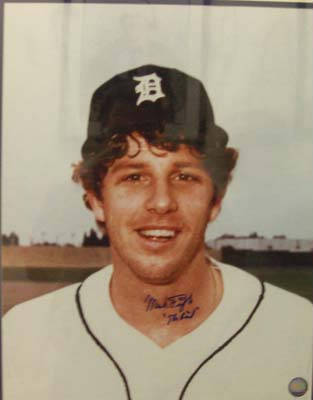
Ed Markowski
One of Us
My wife was playing roulette. Our friends, Steve and
Anna,
were somewhere in the room trying to beat the house,
on
a rainy night at the Leelanau Sands Casino.
I was sitting at the bar listening to an old woman
explain
the finer points of blackjack when I noticed him
windmill
past the wheel of fortune. He was wearing grey
pinstripe
shorts and a matching baseball jersey. His white
sneakers
were dotted with mud from the casino parking lot.
Standing next to the old woman, he ordered a beer
and a
bag of potato chips. I thought I recognized him, but
he
looked the way all of us looked during the demise of
Nixon
and the dawn of Carter. He twisted the cap off the
beer,
tucked the chips in his back pocket, and vanished
back
into the smoky room.
Midway through another Molson, Anna walked up to the
bar
holding a quart sized cup filled with coins. "I hit
the lucky devil for eight-hundred quarters, and
Steve wants you at
the poker table, he said it's an emergency."
When I found the poker table, a red vest was raking
Steve's
bet across the green felt. "You know who that guy is
shoot-
ing craps over there?" Steve asked, pointing to the
baseball
jersey I'd seen at the bar.
"I saw him twenty minutes ago, and I thought he
looked
familiar."
Glancing at the man again, I noticed he was talking
to the
dice as he wound up to throw them. Right then, I knew.
That summer at our house in Ann Arbor had seemed
endless: great films, poetry, beautiful girls, and
baseball.
When Mark Fidrych, aka "The Bird," pitched, the porch was packed.
We watched him make his national television debut on
a Philco black and white, in box seats that John had
found in a tunnel at the stadium.
We expected him to pull rabbits out of his hat, and
he did.
He beat the Yankees that night with a slider that
broke the
wrists of every hitter.
We watched every game he pitched. It was so easy to
envision one of us, one of the guys on the porch,
standing
out there on the mound in Tiger Stadium.
Even though that summer seemed endless, we knew time
was flying, because our baseball heroes weren't our
grand-fathers or fathers anymore. They were us.
At the end of that glorious bicentennial season, he
was
19 and 9. Rookie of the year. Just one of the long-haired guys drinking a beer on the porch in Ann
Arbor.
In July of 1977, I was driving to a writing seminar
in Boulder,
Colorado. Just outside of Ottumwa, Iowa, I picked up
WJR
from Detroit on the car radio. Ernie Harwell's voice, dim but
clear in the cornsilk sunset, said, "Houk took him out
in the fourth...a recurrence of the shoulder injury he
suffered...after he hurt his knee in spring training."
The next morning in Central City, Nebraska, I bought
a Rocky Mountain News from a paper box on a dusty
street corner. On page five of the sports section
there were three
brief lines describing his shoulder injury. And,
that was his
career.
Now, twenty years -- almost to the day -- after the
shoulder
injury, I was standing behind him at a craps table
in Northern Michigan. I tapped that shoulder.
"I just want to thank you for '76."
He turned abruptly and smiled. "Why man? We were
lousy
that year. We didn't win many games."
My wife walked up, and I introduced her. He pumped
her
hand the way he used to pump the hands of his
infielders
when they made a play.
"Why'd you marry this guy?
he asked her. "He actually paid money to
watch the '76 Tigers play." Then he turned to me
and
laughed, "Come on, why'd you like that team?"
"Because, you guys were fun. A hippie pitcher, and a
convict in centerfield. It's hard to explain, but
you were just one of us."
"I still am," he answered. "The only difference is that I had a whole year
in the sun, and most people don't get a minute. Hey man,
I got to be Dizzy Dean for a whole summer. You know,
I beat the odds once in my life."
The roll came back to him. He shook the dice in his right
hand and shouted, "Seven baby, come on, gimme a
seven!" A four came up.
©2004 by Ed Markowski



